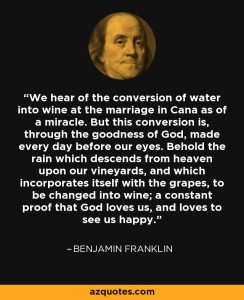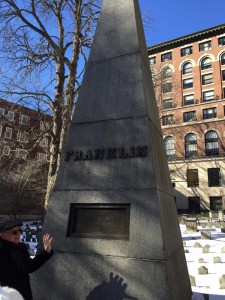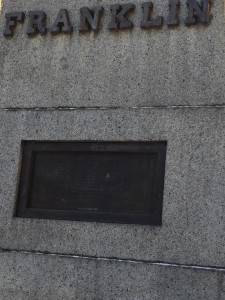There is a famous quote found in all sorts of media involving the alcoholic beverage of beer, “Beer is proof that God loves us and wants us to be happy.” Many people attribute this quote to Benjamin Franklin without even asking the question, did he really say it?
Anyone who asks themselves this question and decides to do research, is going to be disappointed. Benjamin Franklin did not actually say or use this particular phrase. In fact, Benjamin Franklin was not much of a beer lover. However, he did like wine. The quote that is constantly attributed to Benjamin Franklin is actually a misquote of a letter that he wrote in 1779 to the Abbe Morellet, addressing one of his friends. In the letter Franklin mentions the origin of wine and that before wine, man had only water to drink. He says that in this time, man could not discover the truth and instead went astray. Then, after the great flood, God gave man wine in order to quench their thirst and this allowed them to discover many truths. Here is the actual quote from Benjamin Franklin, “We hear of the conversion of water into wine at the marriage in Cana as of a miracle. But this conversion is, through the goodness of God, made every day before our eyes. Behold the rain which descends from heaven upon our vineyards; there it enters the roots of the vines, to be changed into wine; a constant proof that God loves us, and loves to see us happy. The miracle in question was only performed to hasten the operation, under circumstances of present necessity, which required it.” In the actual quote about wine, is the infamous wording of the misquote, “Beer is proof that God loves us and wants us to be happy.”
From this, we can see that sadly, this very famous quote is actually false. However, Franklin was not against alcoholic beverages and instead possessed a love of wine; something which he considered to be very important and a sign of God’s love for mankind.

Sources:
http://www.thefederalistpapers.org/founders/franklin/benjamin-franklin-on-wine-to-the-abbe-morellet
http://freakonomics.com/2011/03/24/quotes-uncovered-beer-or-wine-as-proof/
http://beer.about.com/od/historyofbeer/f/Did-Benjamin-Franklin-Really-Say-Beer-Is-Proof-That-God-Loves-Us-And-Wants-Us-To-Be-Happy.htm







